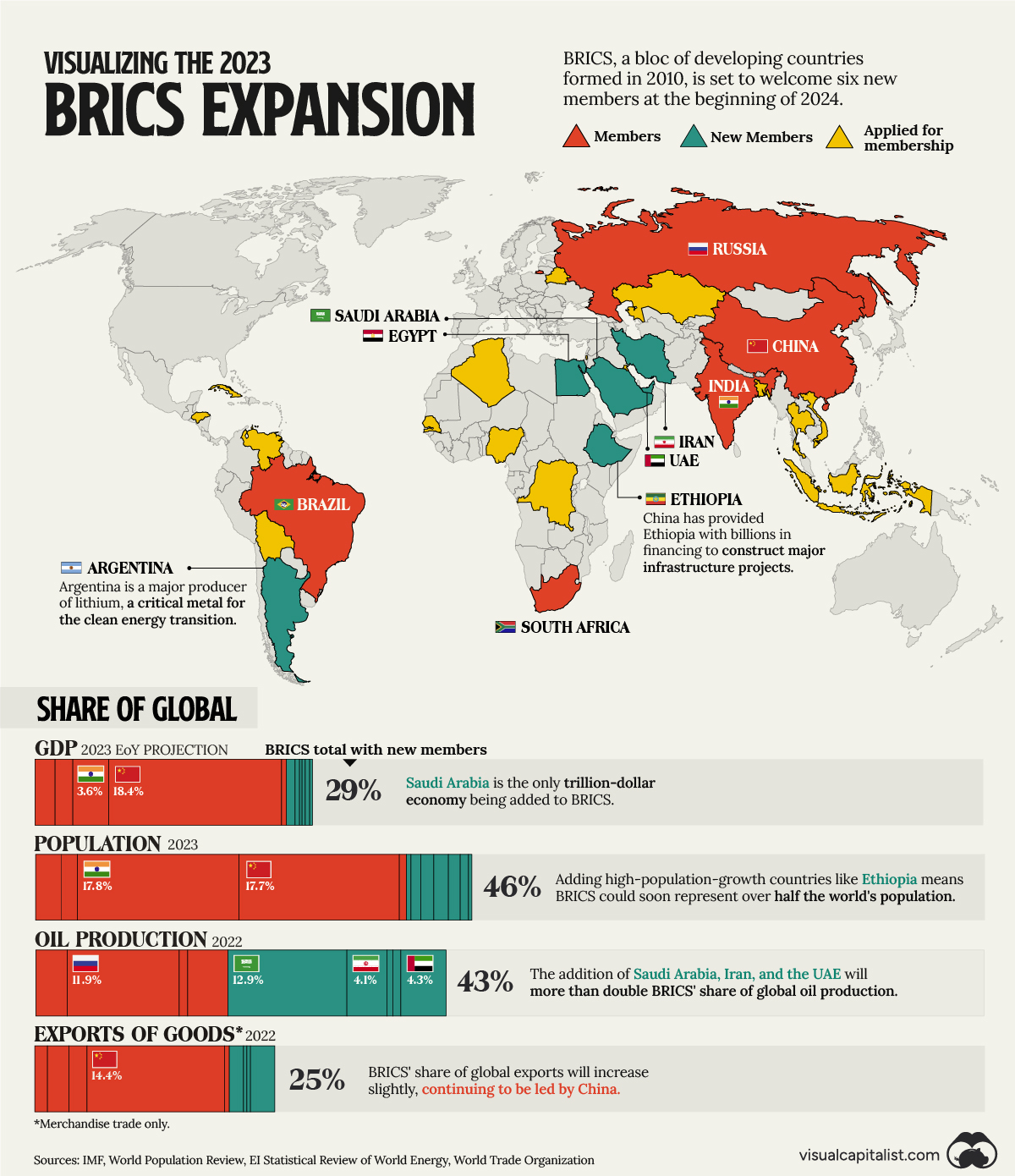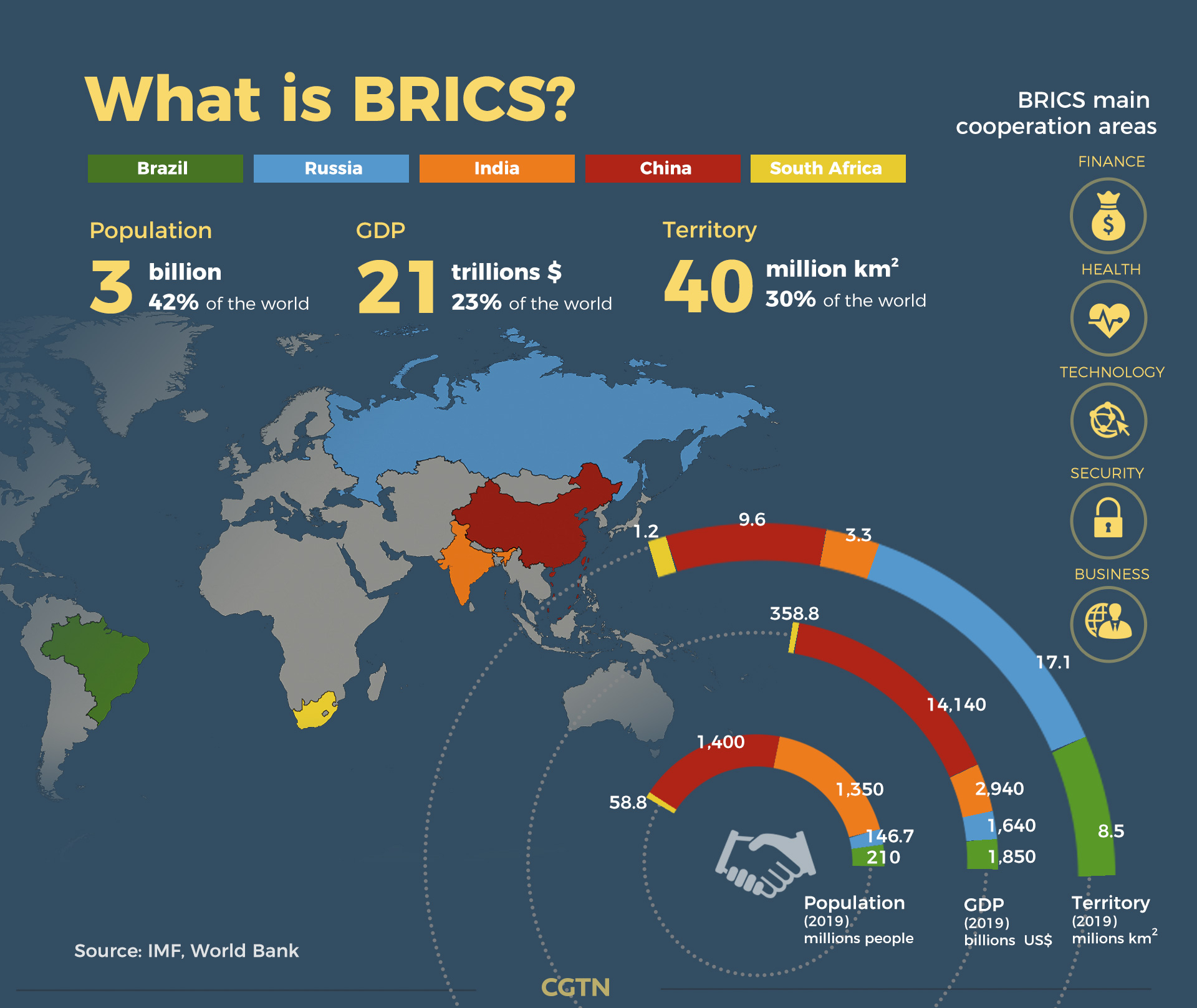International Relations
BRICS and India’s Multipolarity Rhetoric
- 31 Aug 2023
- 15 min read
This editorial is based on “The BRICS test for India’s multipolarity rhetoric” which was published in The Hindu on 22/08/2023. It talks about the challenge before India, to choose between a China-centric or a West-centric world order, or balance the two.
For Prelims: BRICS countries, New Development Bank, Fortaleza Declaration, BRICS Contingent Reserve Arrangement, SWIFT
For Mains: Significance of BRICS, Issues within BRICS, India’s relations with other BRICS countries.
The 15th BRICS summit, a meeting of the leaders of Brazil, Russia, India, China, and South Africa, took place in Johannesburg, South Africa, in August 2023. The summit has provided a platform for cooperation and dialogue among the emerging economies that face common challenges and opportunities in the 21st century. The theme of the summit is “BRICS and Africa: Partnership for Mutually Accelerated Growth, Sustainable Development, and Inclusive Multilateralism”.
What are the Outcomes of the Johannesburg BRICS Summit (BRICS @ 15)?
- Reaffirming Multilateralism and Reform: The BRICS leaders issued a joint declaration that reaffirmed their commitment to multilateralism, international law, and sustainable development. They also expressed their support for the reform of the United Nations and other global institutions to make them more representative and responsive to the needs of developing countries.
- Expanding Membership and Influence: The BRICS leaders endorsed the expansion of the membership of the grouping by inviting 15 countries from Africa and the Global South to participate in a Friends of BRICS meeting.
- The first phase of expansion: The countries including Argentina, Egypt, Ethiopia, Iran, Saudi Arabia, and the UAE have received invitations to join BRICS. This new membership is set to take effect from 1st January 2024.
- There are over 40 countries that have expressed interest in joining BRICS.
- Reasons for the BRICS expansion:
- China's strategic move for global influence.
- Wider engagement among like-minded nations for a common cause.
- Limited options in other groups.
- Anti-western sentiment and Global South unity.
- The first phase of expansion: The countries including Argentina, Egypt, Ethiopia, Iran, Saudi Arabia, and the UAE have received invitations to join BRICS. This new membership is set to take effect from 1st January 2024.
- Common Currency: The BRICS leaders agreed to explore the possibility of creating a common currency for trade and investment among the BRICS countries.
- They tasked their finance ministers and central bank governors to study the feasibility and benefits of such a currency, which could reduce their dependence on the US dollar and other major currencies.
- Regional and Global Issues: The BRICS leaders discussed various issues of regional and global importance, such as the Covid-19 pandemic, climate change, terrorism, cyber security, energy security, trade, and investment.
- They called for equitable access to vaccines and medical supplies for all countries and pledged to enhance their cooperation in health research and innovation.
Note:
- The principles set forth in the BRICS Sanya Declaration of 2011 are aimed at increasing engagement and cooperation with non-BRICS countries, in particular developing countries, and to enhance the voice of the global south in international affairs.
- The Beijing Declaration adopted at the 14th BRICS Summit in 2022 paved the way for membership expansion. China had proposed the “BRICS Plus” expansion plan in 2017.
What are the Challenges India Faces in its Engagement with the BRICS?
- Balancing Rival Interests: India has to balance its relations with China and Russia, which are increasingly seen as strategic rivals by the West.
- China’s rise poses a major challenge and threat to India’s security and interests, especially on issues such as border disputes, maritime security, trade imbalance, technology competition, and human rights.
- Russia’s involvement in the Ukraine war and its alignment with China have also raised concerns in India about its traditional partner’s reliability and credibility.
- Protecting/Practicing and Advocating Democratic Principles: India has to deal with Western normative expectations, without compromising its autonomy or sovereignty.
- India does not want to alienate or antagonize other countries in the global South, who may see merit in China’s or Russia’s efforts at expanding the membership or influence of non-western forums such as BRICS or SCO. India has to pursue a pragmatic and principled foreign policy that serves its national interests and values.
- Managing Bilateral Differences: India has unresolved border disputes and strategic rivalry with China and Pakistan, which affect its relations with the BRICS. India also has divergent views from Russia on issues such as Afghanistan, Iran, and the Indo-Pacific. India has to manage these bilateral differences while pursuing multilateral cooperation within the BRICS.
- India's persistent trade deficit with China has raised concerns about the fairness of economic engagement. This trade imbalance could strain India's economic interests within BRICS and affect its overall economic stability.
- Balancing China’s Dominance: China is the largest and most influential member of the BRICS, with its economic, military, and diplomatic clout surpassing that of the other four members. India has to balance its interests and values with its need to cooperate with China on common issues within the BRICS framework.
- Geopolitical Rivalries: India's complex geopolitical relationships with some BRICS members, such as China and Russia, pose challenges to maintaining a united front on various global issues. Disagreements on regional conflicts and security matters could hinder effective cooperation.
- Developmental Disparities: BRICS includes both developed economies like China and Russia and emerging economies like India and South Africa. Bridging the development gap among member countries to ensure equitable benefits from cooperation remains a significant challenge.
- Coordination on Multilateral Platforms: While BRICS aims to reform global governance institutions, including the United Nations and the International Monetary Fund, member countries often have different priorities and approaches to these reforms.
- Varied Security Concerns: BRICS member countries have diverse security concerns, ranging from terrorism and regional conflicts to cyber threats. Aligning these concerns and coordinating joint security initiatives requires careful negotiation.
- Shifting Global Alliances: As geopolitical dynamics evolve, some BRICS members may seek closer ties with countries or organizations outside the group. This can impact the cohesion and collective bargaining power of BRICS on the global stage.
What Do We Need to Know About the BRICS?
- About:
- BRICS is an acronym for the grouping of the world’s leading emerging economies, namely Brazil, Russia, India, China, and South Africa.
- In 2001, the British Economist Jim O’Neill coined the term BRIC to describe the four emerging economies of Brazil, Russia, India, and China.
- The grouping was formalised during the first meeting of BRIC Foreign Ministers’ in 2006.
- South Africa was invited to join BRIC in December 2010, after which the group adopted the acronym BRICS.
- Share of BRICS:
- The BRICS brings together five of the largest developing countries of the world, representing 41% of the global population, 24% of the global GDP, and 16% of the global trade.
- Chairmanship:
- The chairmanship of the forum is rotated annually among the members, in accordance with the acronym B-R-I-C-S.
- India was the chair for 2021.
- Initiatives of the BRICS:
- New Development Bank: During the Sixth BRICS Summit in Fortaleza (Brazil) in 2014, the leaders signed the Agreement establishing the New Development Bank (NDB - Shanghai, China).
- Contingent Reserve Arrangement:
- In 2014, the BRICS governments signed a treaty on the setting up of the contingent reserve arrangement
- The arrangement is aimed at forestalling short-term balance of payments pressures, providing mutual support, and strengthening the financial stability of the BRICS nations.
- BRICS Payment System:
- BRICS countries are trying to create a payment system as an alternative to the SWIFT payment system.
- This has taken on a new urgency as post Ukraine war, Russia has been frozen out of SWIFT.
- Customs Agreements:
- Customs agreements were signed to coordinate and ease trade transport between BRICS countries
- Launched of Remote Sensing Satellite:
- A Remote Sensing constellation of satellites has been launched – with 6 satellites including 2 from India, 2 from China, 1 from Russia, and 1 from Brazil-China collaboration.
What Are the Possible Areas of Cooperation Within BRICS?
- Cooperation Within the Group: BRICS needs to shed the centrality from China and create a better internal balance, reinforced by the urgent need for diversification.
- For BRICS to remain relevant over the next decades, each of its members must make a realistic assessment of the opportunities and inherent limitations.
- The grouping shall also explore the ‘BRICS plus’ cooperation at more levels and in a wider scope.
- This will increase BRICS countries’ representation and influence and make greater contributions to world peace and development.
- Upholding Universal Security: BRICS countries should be builders of universal security. Seeking one’s own security at the expense of others’ will only create new tensions and risks.
- It is important to respect and guarantee the security of every country, replace confrontation with dialogue and partnership, and promote the building of a balanced, effective, and sustainable regional security architecture.
- Also, it is equally important to strengthen political mutual trust and security cooperation, maintain communication and coordination on major international and regional issues, and accommodate each other’s core interests and major concerns.
- Securing Economic Interests: BRICS countries should be contributors of common development.
- Facing the rising tide of de-globalisation and the increase of unilateral sanctions, BRICS countries should enhance mutually beneficial cooperation in supply chains, energy, food, and financial resilience
- Also, it will be useful for BRICS to develop an institutional research wing, along the lines of the OECD, offering solutions which are better suited to the developing world.
- Public Health Governance: BRICS countries should fully leverage their respective strengths, and jointly promote the development of global health governance in a direction in favour of developing countries.
- India’s vision of ‘One Earth, One Health’ contributes to multilateral cooperation on public health.
- The countries should make good use of the BRICS Vaccine Research and Development Centre, establish a BRICS early warning mechanism for preventing large-scale infectious diseases, and provide high-quality public goods for global health governance cooperation.
- A Global Governance Philosophy: Global challenges are emerging one after another. Coping with these challenges requires coordination among global actions.
- Safeguarding the international system is essential while ensuring that international affairs have participation by all, international rules are formulated by all, and development outcomes are shared by all.
- BRICS should embrace a global governance philosophy that emphasises extensive consultation, joint contribution, and shared benefits, enhance unity and cooperation with emerging markets and developing countries, and increase the voice in global governance.
|
Drishti Mains Question How do BRICS cooperate and compete with other regional and global organizations? What are the implications of BRICS expansion and outreach for Africa and other developing countries? |
UPSC Civil Services Examination, Previous Year Questions (PYQs)
Q. Consider the following statements: (2016)
- New Development Bank has been set up by APEC.
- The headquarters of the New Development Bank is in Shanghai.
Which of the statements given above is/are correct?
(a) 1 only
(b) 2 only
(c) Both 1 and 2
(d) Neither 1 nor 2
Ans: (b)
Q. The ‘Fortaleza Declaration’, recently in the news, is related to the affairs of (2015)
(a) ASEAN
(b) BRICS
(c) OECD
(d) WTO
Ans: (b)
Q. With reference to a grouping of countries known as BRICS, consider the following statements: (2014)
- The First Summit of BRICS was held in Rio de Janeiro in 2009.
- South Africa was the last to join the BRICS grouping.
Which of the statements given above is/are correct?
(a) 1 only
(b) 2 only
(c) Both 1 and 2
(d) Neither 1 nor 2
Ans: (b)








